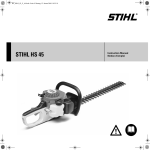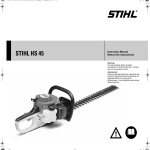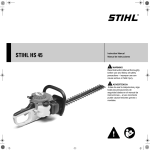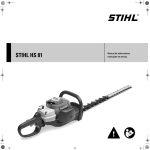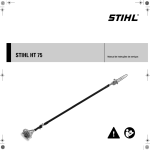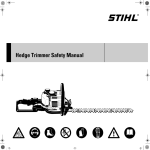Download STIHL HS 45
Transcript
BA_HS45_01_U_D4.book Seite 0 Freitag, 19. März 2004 1:35 13 STIH) STIHL HS 45 Instruction Manual English © ANDREAS STIHL AG & Co. KG, 2006 0458 253 0121. M7. E6. Fi. Printed in Germany Printed on chlorine-free paper. Printing inks contain vegetable oils; paper can be recycled. BA_SE_040_002_01_10.fm Contents Guide to Using this Manual .............. 2 Safety Precautions and Working Techniques ......................... 3 Using the Unit ................................... 9 Fuel ................................................ 10 Fueling ............................................ 12 Starting / Stopping the Engine ........ 12 Cleaning the Air Filter ..................... 14 Adjusting the Carburetor ................ 15 Checking the Spark Plug ................ 16 Engine Running Behavior ............... 17 Lubricating the Gearbox ................. 17 Rewind Starter ................................ 18 Storing the Machine ........................ 18 Sharpening Instructions .................. 18 Inspections and Maintenance by Dealer ........................................ 19 Maintenance Chart ......................... 20 Minimize Wear and Avoid Damage ................................ 21 Parts and Controls .......................... 22 Specifications ................................. 23 Special Accessories ....................... 23 Maintenance and Repairs ............... 24 Certificate of Conformity ................. 24 Dear Customer, Thank you for choosing a quality engineered STIHL product. This machine has been built using modern production techniques and comprehensive quality assurance. Every effort has been made to ensure your satisfaction and troublefree use of the machine. Please contact your dealer or our sales company if you have any queries concerning your machine. Hans Peter Stihl STIHl HS 45 1 English Guide to Using this Manual Pictograms All the pictograms attached to the machine are shown and explained in this manual. The operating and handling instructions are supported by illustrations. In addition to the operating instructions, this manual may contain paragraphs that require your special attention. Such paragraphs are marked with the symbols described below: Symbols in text Warning where there is a risk of an accident or personal injury or serious damage to property. The individual steps or procedures described in the manual may be marked in different ways: Caution where there is a risk of damaging the machine or its individual components. : Note or hint which is not essential for using the machine, but may improve the operator’s understanding of the situation and result in better use of the machine. A bullet marks a step or procedure without direct reference to an illustration. A description of a step or procedure that refers directly to an illustration may contain item numbers that appear in the illustration. Example: Loosen the screw (1) Lever (2) ... 2 Note or hint on correct procedure in order to avoid damage to the environment. Equipment and features This instruction manual may refer to several models with different features. Components that are not installed on all models and related applications are marked with an asterisk (*). Such components may be available as special accessories from your STIHL dealer. Engineering improvements STIHL’s philosophy is to continually improve all of its products. As a result, engineering changes and improvements are made from time to time. If the operating characteristics or the appearance of your machine differ from those described in this manual, please contact your STIHL dealer for assistance. Therefore some changes, modifications and improvements may not be covered in this manual. HS 45 English Safety Precautions and Working Techniques Because this is a highspeed, fast-cutting power tool with sharp cutting blades, special safety precautions must be observed during operation. It is important that you read and understand the instruction manual before using the unit for the first time. Keep the manual in a safe place for future reference. Non-observance of the safety precautions in the instruction manual may cause serious or even fatal injury. Always observe local safety regulations, standards and ordinances. If you have not used this type of power tool before: Have your dealer or other experienced user show you how to operate your power tool or attend a special course of training in power tool operation. HS 45 Minors should never be allowed to use a power tool. Bystanders, especially children, and animals should not be allowed in the area where a power tool is in use. When the machine is not in use (work break), shut it off so that it does not endanger others and secure it against unauthorized use. The power tool user is responsible for avoiding injury to third parties or damage to their property. Do not lend or rent your power tool without the instruction manual. Be sure that anyone using your power tool understands the information contained in this manual. To operate the power tool you must be rested, in good physical condition and mental health. If you have any condition that might be aggravated by strenuous work, check with your doctor before operating a power tool. Persons with pacemakers only: The ignition system of your unit produces an electromagnetic field of a very low intensity. This field may interfere with some pacemakers. To reduce health risks, STIHL recommends that persons with pacemaker consult their physician and the pacemaker manufacturer before operating this tool. Do not operate the power tool if you are under the influence of any substance (drugs, alcohol) which might impair vision, dexterity or judgment. Use your power tool only for cutting hedges, shrubs, scrub, bushes and similar material. It must not be used for any other purpose since this may result in accidents or damage to the machine. Never attempt to modify your power tool in any way since this can be extremely dangerous and also result in accidents or damage to the machine. 3 English Only mount cutting blades and accessories that are explicitly approved for this power tool model by STIHL or are technically identical. If you have any questions in this respect, consult a servicing dealer. To reduce the risk of accidents or damage to the machine, use only high quality tools and replacement parts. STIHL recommends the use of STIHL original tools and accessories. The characteristics of these components are specifically designed to match your machine and meet your performance requirements. Clothing and Equipment Transporting the Machine Wear proper protective clothing and equipment. Always turn off the engine and always fit the blade scabbard over the cutting blades – even when you carry the machine for short distances. Clothing must be sturdy but allow complete freedom of movement. Wear snug-fitting clothing, e.g. an overall and jacket combination, do not wear a work coat. Avoid loose-fitting jackets, scarves, neckties, jewellery or anything that could get caught on moving parts of the machine. Tie up and confine long hair (e.g. with a hair net, cap, hard hat, etc.). Wear sturdy footwear with non-slip soles. Wear safety glasses. Wear hearing protection, e.g. earplugs or ear muffs. Wear heavy-duty gloves, preferably made of leather. Carry the power tool by the handle – cutting blades behind you. Avoid touching hot parts of the machine, especially the muffler and gear housing – you could suffer serious burns. Transporting in a vehicle: Properly secure your unit to prevent turnover, fuel spillage and damage. Fueling Gasoline is an extremely flammable fuel. Keep clear of naked flames and fire. Do not spill any fuel – do not smoke. Always shut off the engine before refueling. Do not fuel a hot engine – fuel may spill and cause a fire. STIHL offers a comprehensive range of safety clothing and equipment. 4 Open the fuel cap carefully to allow any pressure build-up in the tank to release slowly and avoid fuel spillage. HS 45 English Fuel your power tool in a well-ventilated area, outdoors only. If you spill fuel, wipe the machine immediately – if fuel gets on your clothing, change immediately. Your power tool comes standard with either a screw-type or bayonet-type fuel cap. After fueling, tighten down the screw-type fuel cap as securely as possible. Insert the fuel cap with hinged grip (bayonet type cap) correctly in the opening, turn it clockwise as far as stop and fold the grip down. Before Starting Check that your power tool is properly assembled and in good condition – refer to appropriate chapters in the instruction manual: – Engage the blade lock (if fitted). – Slide control / stop switch must move easily to STOP or 0 – Smooth action of throttle trigger and throttle trigger interlock (if fitted) – throttle trigger must return automatically to idle position. – – Cutting blades securely mounted and in good condition (clean, move freely, not warped), properly sharpened and sprayed with STIHL resin solvent (lubricant). – Check cutting blade guard for damage (if fitted). This reduces the risk of unit vibrations causing the fuel cap to loosen or come off and spill quantities of fuel. To reduce the risk of serious or fatal burn injuries, check for fuel leakage. If fuel leakage is found, do not start or run the engine until leak is fixed. HS 45 Check that spark plug boot is secure – a loose boot may cause arcing that could ignite combustible fumes and cause a fire. – Never attempt to modify the controls or safety devices. – Keep the handles dry and clean, free from oil and dirt, for safe control. To reduce the risk of accidents, operate your power tool only if it is in good working order. Starting the Engine Start the engine at least 3 meters from the fueling spot, outdoors only. Place the unit on firm ground in an open area. Make sure you have good balance and secure footing. Hold the unit securely. The cutting blades must be clear of the ground and all other obstructions because they may begin to run when the engine starts. Your power tool is a one-person unit. Do not allow other persons in the general work area, even when starting. 5 English To reduce the risk of injury, avoid contact with the cutting blades. Holding and Controlling the Machine Do not drop start the power tool. The correct starting procedure is described in your instruction manual. Always hold the unit firmly with both hands on the handles. Wrap your fingers and thumbs around the handles. In the event of imminent danger or in an emergency, switch off the engine immediately – move the slide control / stop switch to 0 or STOP. Note that the cutting blades continue to run for a short period after you let go of the throttle trigger (flywheel effect). Make sure you always have good balance and secure footing. Check that there are no bystanders in the general work area. Right-handers Observe the cutting blades at all times – do not cut any areas of the hedge that you cannot see. Check the idle speed setting. The cutting blades must not move when the engine is idling with the throttle trigger released. During Operation When cutting the top of a taller hedge, check the other side of the hedge frequently for bystanders, animals and obstructions. Right hand on the control handle and left handle on the front handle. Left-handers Make sure the idle speed setting is correct. The cutting blades must not run when the engine is idling with the throttle trigger released. Check and correct the idle speed setting at regular intervals. If the cutting blades still run, have your dealer check your machine and make proper adjustments or repairs. Left hand on the control handle and right hand on the front handle. 6 HS 45 English Note that the cutting blades continue to run for a short period after you let go of the throttle trigger (flywheel effect). Take special care in slippery conditions – damp, snow, ice, on slopes, uneven ground, etc. Clear away fallen branches, scrub and cuttings. Watch out for obstacles such as tree stumps and roots which could cause you to trip or stumble. Make sure you always have firm and secure footing. When working at a height that exceeds the unit’s reach: – Use a lift bucket – Never work on a ladder – Never work on an insecure support – Never operate your unit with one hand Be particularly alert and cautious when wearing hearing protection because your ability to hear warnings (shouts, alarms, etc.) is restricted. To reduce the risk of accidents, take a break in good time to avoid tiredness or exhaustion. HS 45 Work calmly and carefully – in daylight conditions and only when visibility is good. Stay alert at all times so as not to endanger others. The dust, vapor and smoke created during operation may be damaging to health. Wear a suitable respirator in very dusty or smoky conditions. Your power tool produces toxic exhaust fumes as soon as the engine is running. These fumes may be colorless and odorless. Never run the engine indoors or in poorly ventilated locations, even if your model is equipped with a catalytic converter. The gearbox becomes hot during operation. To reduce the risk of burn injury, do not touch the gear housing. To reduce the risk of serious of fatal injury from breathing toxic fumes, ensure proper ventilation when working in trenches, hollows or other confined locations. Operate your power tool so that it produces a minimum of noise and emissions – do not run engine unnecessarily, accelerate the engine only for cutting. To reduce risk of fire, do not smoke while operating or standing near your power tool. Note that combustible fuel vapor may escape from the fuel system. If your power tool is subjected to unusually high loads for which it was not designed (e.g. heavy impact or a fall), always check that it is in good condition before continuing work – see also “Before Starting”. Check in particular that the fuel system is tight (no leaks) and the safety devices are working properly. Do not continue operating your power tool if it is damaged. In case of doubt, have the machine checked by your servicing dealer. Do not operate your power tool with the starting throttle lock engaged as you do not have control of the engine speed in this position. 7 English Inspect hedge and work area to avoid damaging the cutting blades: – Remove stones, rocks, pieces of metal and other solid objects. – When working close to the ground, make sure that no sand, grit or stones get between the blades. – Take particular care when cutting hedges next to or against wire fences. Do not touch wire with the cutting blades. To avoid the risk of electrocution, do not touch electric power lines – never cut through electric power lines. Do not touch the cutting blades while the engine is running. If the cutting blades become jammed by thick branches or other obstructions, switch off the engine immediately before attempting to free the blades. Opening the throttle while the blades are blocked increases the load and reduces engine speed. The clutch then slips continuously and this causes overheating and damage to important components (e.g. clutch, polymer housing components) – and this can increase the risk of injury from the blades moving while the engine is idling. 8 If the hedge is very dusty or dirty, spray the blades with STIHL resin solvent from time to time during cutting. This helps reduce blade friction as well as the aggressive effects of sap and the buildup of dirt particles. Always shut off the engine before leaving the unit unattended. Check the cutting blades at regular short intervals during operation or immediately if there is a noticeable change in cutting bahvior: – Shut off the engine. – Wait until the cutting blades have come to a complete standstill. – Check condition and tightness, look for cracks. – Check sharpness. To reduce the risk of fire, always clean plant residue, chips, leaves and excess lubricant off the engine and muffler. After Finishing Work Always clean dust and dirt off the machine – do not use any grease solvents for this purpose. Vibrations Prolonged use of the unit may result in vibration-induced circulation problems in the hands (whitefinger disease). No general recommendation can be given for the length of usage because it depends on several factors. The period of usage is prolonged by: – Hand protection (wearing warm gloves) – breaks The period of usage is shortened by: – Any personal tendency to suffer from poor circulation (symptoms: frequently cold fingers, itching). – Low outside temperatures. – Gripping force (a tight grip hinders circulation). Continual and regular users should monitor closely the condition of their hands and fingers. If any of the above symptoms appear, seek medical advice. Spray the blades with STIHL resin solvent. Start and run the engine briefly so that the solvent is evenly distributed. HS 45 English Using the Unit Maintenance and repairs The machine must be serviced regularly. Do not attempt any maintenance or repair work not described in your Owner’s Manual. All other work should be carried out by a servicing dealer. STIHL recommends that maintenance and repair work be carried out only by authorized STIHL dealers. STIHL dealers receive regular training and are supplied with technical information. Use only high-quality replacement parts, in order to avoid the risk of accidents or damage to the machine. Contact a dealer if in doubt. STIHL recommends the use of genuine STIHL spare parts. Such parts have been optimized for the machine and the user's requirements. Before starting any maintenance or repair work and before cleaning the machine, always stop the engine and disconnect the spark plug boot to avoid all risk of injury if the engine starts up inadvertently. – Exception: adjustment of carburetor and idle speed. HS 45 Do not service or store the machine near a naked light – risk of fire due to the fuel. Cutting season Check fuel cap regularly for tightness. Observe all country-specific and local regulations and ordinances regarding hedge trimming. Use only the spark plugs approved by STIHL – see Specifications. Do not use your hedge trimmer during other people's rest periods. Inspect ignition lead (insulation in good condition, secure connection). To reduce the risk of fire due to ignition outside the cylinder, move the slide control / stop switch to STOP or 0 before turning the engine over on the starter with the spark plug boot removed or the spark plug unscrewed. Cutting sequence Use lopping shears or a chainsaw to cut out thick branches first. Cut both sides of the hedge first, then the top. Check that the muffler is in perfect working condition. Do not use the machine if the muffler is damaged or missing – risk of fire! – Hearing damage! Do not touch the hot muffler – risk of burns! The condition of the anti-vibration buffers influences the machine's vibrations – they must be examined regularly. 9 English Fuel Cutting techniques Your engine requires a mixture of gasoline and engine oil. For health reasons, avoid direct skin contact with gasoline and avoid inhaling gasoline vapor. STIHL MotoMix STIHL recommends the use of STIHL MotoMix. This ready-to-use fuel mix contains no benzol or lead, has a high octane rating and ensures that you always use the right mix ratio. STIHL MotoMix is specially formulated for use in STlHL engines and guarantees a long engine life. MotoMix is not available in all markets. Horizontal cut: Vertical cut: Swing the cutting blade from the bottom upwards in an arc – lower the nose of the blade, move along the hedge and then swing the blade up again in an arc. 10 Hold the cutting blade at an angle of 0° to 10° as you swing the hedge trimmer horizontally. Swing the blade in an arc towards the outside of the hedge so that the cuttings fall to the ground. Mixing Fuel Unsuitable fuels or lubricants or mix ratios other than those specified may result in serious damage to the engine. Poor quality gasoline or engine oil may damage the engine, sealing rings, hoses and the fuel tank. HS 45 English Gasoline Mix Ratio Storing Fuel Use only high-quality brand-name gasoline with a minimum octane rating of 90 – leaded or unleaded. STIHL 50:1 two-stroke engine oil: 50 parts gasoline to 1 part oil Store fuel only in approved safety-type fuel canisters in a dry, cool and safe location protected from light and the sun. If your machine is equipped with a catalytic converter, you must use unleaded gasoline. A few tankfuls of leaded gasoline will greatly reduce the efficiency of the catalytic converter. Engine Oil Use only quality two-stroke engine oil. We recommend STIHL two-stroke engine oil since it is specially formulated for use in STlHL engines and guarantees a long engine life. If STIHL two-stroke engine oil is not available, use only quality two-stroke oil designed for use in air cooled engines. Do not use oils designed for water cooled engines or engines with a separate lubricating system (e.g. conventional four-stroke engines). Use only STIHL 50:1 two-stroke engine oil for the fuel mix in models with a catalytic converter. HS 45 Other high-quality two-stroke engine oils: 25 parts gasoline to 1 part oil Examples Gaso- STIHL line engine oil 50:1 Liters 1 5 10 15 20 25 : Liters 0.02 0.10 0.20 0.30 0.40 0.50 (cc) (20) (100) (200) (300) (400) (500) Other highquality twostroke engine oils: 25:1 Liters (cc) 0.04 (40) 0.20 (200) 0.40 (400) 0.60 (600) 0.80 (800) 1.00 (1000) Use a canister approved for storing fuel. Pour oil into the canister first, then add gasoline and mix thoroughly. Fuel mix ages: Only mix sufficient fuel for a few weeks work. Do not store fuel mix for longer than 3 months. Exposure to light, the sun, low or high temperatures can quickly make the fuel mix unusable. : Thoroughly shake the mixture in the canister before fueling your machine. Pressure may build up in the canister – open it carefully. : Clean the fuel tank and canister from time to time. Dispose of remaining fuel and cleaning fluid properly in accordance with local regulations and environment requirements. 11 English Fueling Starting / Stopping the Engine 7 Position the unit so that the filler cap is facing up. Observe safety precautions 253BA004 KN Set the choke lever (6): For cold start to g For warm start to e : Press fuel pump bulb (7) at least five times. : Place the machine on the ground. : Remove the blade scabbard. Start as follows: : Take care not to spill fuel while fueling and do not overfill the tank. STIHL recommends use of the STIHL filling system (special accessory). Move the blade lock lever (1) forwards against stop - in direction of front handle. 2 3 Important! After fueling, tighten down the filler cap by hand as securely as possible. 5 Have the fuel pickup body in the tank changed once every year. 12 : 4 253BA005 KN : Before fueling, clean the filler cap and the area around it to ensure that no dirt falls into the tank. 253BA003 KN : 1 253BA002 KN 253BA001 KN 6 : Stop switch (2) to I : Press down the throttle trigger interlock lever (3), squeeze the throttle trigger (4) and hold in that position. : Press in the starting throttle lock (5). : Release the throttle trigger, interlock lever and starting throttle lock, this is the starting throttle position. Make sure that cutting blades are not touching the ground or any other obstacles. : Make sure you have a firm footing: Hold the machine firmly on the ground with your left hand on the front handle and press down. HS 45 English : Pull the starter grip slowly with your right hand until you feel it engage and then give it a brisk strong pull. Do not pull out the starter rope all the way - it might otherwise break. Do not let the starter grip snap back. Guide it slowly back into the housing so that it can rewind properly. If the engine stops during warm-up or acceleration: : Repeat starting procedure as described under “If engine is cold” : Move the blade lock lever back against stop – in direction of rear handle. Make sure the carburetor is correctly adjusted - cutting blades must not run when engine is idling. If the engine is cold: (choke position g) : Pull the starter rope five times. : Move the choke lever (6) to e : Continue cranking until engine runs. Note: If the engine does not start after 10 pulls with the choke lever set to e : Set choke to g , pull the starter rope five times, move choke to e and continue cranking. If engine is warm: : Your unit is now ready for operation. 8 253BA006 KN : If the engine still does not start: : Move stop switch to 0 : Pull off the spark plug boot (8). : Unscrew and dry off the spark plug. To stop the engine: : Open the throttle wide. : Move stop switch to 0 : Crank the engine several times with the starter to clear the combustion chamber. Additional hints on starting : Refit the spark plug and connect the spark plug boot - push it down firmly. : Move stop switch to I : Set choke lever to e even if the engine is cold. : Now start the engine. If the engine does not start: : Make sure all settings are correct (choke shutter, throttle trigger in starting throttle position, stop switch to I) : Repeat the starting procedure Continue cranking until engine runs (choke lever to e ) As soon as the engine runs: : Blip the throttle trigger so that the engine settles down to idle speed. HS 45 13 English Cleaning the Air Filter 5 7 3 2 1 Fuel tank run until dry and then refueled 253BA008 KN 253BA007 KN 2 Dirty air filters reduce engine power, increase fuel consumption and make starting more difficult. : Press the fuel pump bulb (7) at least five times - even when bulb is filled with fuel. If there is a noticeable loss of engine power : Now start the engine. : Move the choke lever to g : Press down the tab (1) and swing the filter cover (2) open. : Clean away loose dirt from around the filter. 14 253BA009 KN 4 : Remove the foam element (3) and the felt element (4). : Wash the foam element in a clean, non-flammable solution (e.g. warm soapy water) and then dry. : Install a new felt filter element . As a temporary measure you can knock it out on the palm of you hand or blow it out with compressed air - do not wash! : Replace any damaged parts. : Fit foam element (3) in the filter cover (2) and felt element (4) in the filter housing (5). : Close the filter cover so that it snaps into position. HS 45 English Adjusting the Carburetor General Information L 1 LA 253BA000 KN H 3/4 Standard Setting Adjusting Idle Speed : Shut off the engine. Engine stops while idling : Inspect cutting blades and clean if necessary (clean, move freely, not warped). : Low speed screw (L) must be one turn open. : Check the air filter and clean or replace if necessary. : : Turn high speed screw (H) counterclockwise (max. 3/4 turn) as far as stop. Turn idle speed screw (LA) slowly clockwise until the engine runs smoothly – cutting blades must not run. The carburetor comes from the factory with a standard setting. : This setting provides an optimum fuel-air mixture under most operating conditions. Carefully screw the low speed screw (L) down onto its seat. Then open it one turn counterclockwise : Start and warm up the engine. : Adjust idle speed with the idle speed screw (LA) so that the cutting blades do not run. With this carburetor it is only possible to adjust the high speed screw within fine limits. Cutting blades run when engine is idling : Turn idle speed screw (LA) slowly counterclockwise until cutting blades stop running and then turn the screw about another 1/2 to 1 turn in the same direction. Erratic idling behavior, poor acceleration (although low speed screw is one turn open) : Idle setting too lean: Turn low speed screw (L) counterclockwise until the engine runs and accelerates smoothly. It is usually necessary to change the setting of the idle speed screw (LA) after every correction to the low speed screw (L). HS 45 15 English Checking the Spark Plug Fine Tuning for Operation at High Altitude or at Sea Level L 1 000BA002 KN A slight correction of the setting of the high speed screw (H) may be necessary if engine power is not satisfactory when operating at high altitude or at sea level. At high altitudes : Turn the high speed screw (H) clockwise (leaner) no further than stop. At sea level If engine is down on power, difficult to start or runs poorly at idle speed, first check the spark plug. : : Remove the spark plug – see "Starting / Stopping the Engine". : Clean dirty spark plug. : Check electrode gap (A) and readjust if necessary – see "Specifications". 16 – To much oil in fuel mix. – Dirty air filter. – Unfavorable running conditions. : Fit a new spark plug after about 100 operating hours – or sooner if the electrodes are badly eroded. Install only suppressed spark plugs of the type approved by STIHL – see "Specifications". Turn the high speed screw (H) counterclockwise (richer) no further than stop. To reduce the risk of arcing and fire: 1 000BA045 KN LA Rectify the problems which have caused fouling of spark plug: 253BA000 KN H 3/4 : : If the spark plug comes with a detachable adapter nut (1), screw it on firmly. HS 45 English Engine Running Behavior Lubricating the Gearbox If engine running behavior is unsatisfactory even though the air filter is clean and the carburetor properly adjusted, the cause may be in the muffler. 2 : Have the muffler checked for contamination (coking). 1 STIHL recommends that all maintenance and repair work be carried out by an authorized STIHL dealer. 3 : On all spark plugs: Always press the boot (2) firmly on to the spark plug (3). 253BA012 KN 000BA050 KN 2 Lubricate the blade drive gear with STIHL gear lubricant for hedge trimmers. After about 50 hours of operation: : Remove the screw plug (1) from the gearbox. : Screw the tube of grease (2) into the filler hole. : Squeeze up to 5 g (1/4 oz) grease into the gearbox. Do not completely fill the gearbox with grease. : HS 45 Refit the filler plug and tighten it down firmly. 17 English Rewind Starter Storing the Machine Sharpening Instructions To help prolong the wear life of the starter rope, observe the following points: For periods of about 3 months or longer : Drain and clean the fuel tank in a well ventilated area. : : Dispose of fuel properly in accordance with local environmental requirements. The blades must be resharpened if cutting performance and behavior begin to deteriorate (i.e. if blades frequently snag on branches). : Run engine until carburetor is dry – this helps prevent carburetor diaphragms sticking together. Pull the starter rope only in the direction specified. It is best to have the cutting blades resharpened by a specialist on a workshop sharpener. STIHL recommends you have this work performed by a STIHL servicing dealer. : Do not pull the rope over the edge of the guide bushing. : Do not pull out the rope more than specified since it might break. : Do not let the starter grip snap back, guide it slowly into the housing. See also chapter “Starting / Stopping the Engine”! : Clean the cutting blades, check condition and spray with STIHL resin solvent. It is also possible to use a flat crosscut sharpening file. See “Specifications” for prescribed sharpening angle. : Fit the blade scabbard. : Replace a damaged starter rope in good time or have it replaced by your STIHL dealer! : Thoroughly clean the machine – pay special attention to the cylinder fins and air filter. Always file towards the cutting edge. : : Store the machine in a dry, high or locked location – out of the reach of children and other unauthorized persons. The file only sharpens on the forward stroke – lift it off the blade on the backstroke. : Use a whetstone to remove burr from cutting edge. : Remove as little material as possible. : After sharpening, clean filing or grinding dust off the cutting blades and lubricate with grease. Do not operate your machine with dull or damaged cutting blades. This may cause overload and will give unsatisfactory cutting results. 18 HS 45 English Inspections and Maintenance by Dealer Fuel pickup body in tank : Have the pickup body in the fuel tank replaced every year. Spark arresting screen in the muffler* : If the engine is low on power, have the spark arresting screen in the muffler checked STIHL recommends that maintenance and repair work be carried out only by authorized STIHL dealers. * see “Guide to Using this Manual” HS 45 19 English Complete machine Control handle Air filter Filter in fuel tank Fuel tank Carburetor Spark plug Cooling air intake Visual inspection (conditon, leaks) X X All accessible screws and nuts (not adjusting screws) Cutting blades Gear lubrication Safety label X if required X X Replace Have checked by servicing dealer1) X Have replaced by servicing dealer1) X X X Clean Check idle setting if damaged if problem every 12 months monthly weekly X Clean X X X X X Readjust idle X Readjust electrode gap Replace after about 100 operating hours Visual inspection X X Clean Have checked by servicing dealer1) Spark arresting screen in muffler after each refueling stop X X Clean Check operation after finishing work or daily The following maintenance intervals apply to normal operating conditions only. If your daily working time is longer than normal or operating conditions are difficult (very dusty work area etc.), shorten the specified intervals accordingly. before starting work Maintenance Chart X Have cleaned or replaced by servicing dealer1 X Tighten X Clean X Sharpen X Check X X Top up Replace X 1) STIHL recommends that this work be done by a STIHL servicing dealer 20 HS 45 English Minimize Wear and Avoid Damage Observing the instructions in this manual helps reduce the risk of unnecessary wear and damage to the power tool. The power tool must be operated, maintained and stored with the due care and attention described in this owner’s manual. The user is responsible for all damage caused by non-observance of the safety precautions, operating and maintenance instructions in this manual. This includes in particular: – Alterations or modifications to the product not approved by STIHL. – Using tools or accessories which are neither approved or suitable for the product or are of a poor quality. – Using the product for purposes for which it was not designed. – Using the product for sports or competitive events. – Consequential damage caused by continuing to use the product with defective components. HS 45 Maintenance Work Parts Subject to Wear and Tear All the operations described in the "Maintenance Chart" must be performed on a regular basis. If these maintenance operations cannot be performed by the owner, they should be performed by a servicing dealer. Some parts of the power tool are subject to normal wear and tear even during regular operation in accordance with instructions and, depending on the type and duration of use, have to be replaced in good time. Among other parts, this includes: STIHL recommends that you have maintenance and repair work carried out only by an authorized STIHL servicing dealer. STIHL servicing dealers are able to attend regular training courses and receive technical information bulletins on the latest engineering changes. If these operations are not carried out as specified, the user assumes responsibility for any damage that may occur. Among other things, this includes: – Damage to the engine due to neglect or deficient maintenance (e.g. of air and fuel filters), incorrect carburetor adjustment or inadequate cleaning of cooling air inlets (intake ports, cylinder fins). – Corrosion and other consequential damage resulting from improper storage. – Damage to the product resulting from the use of poor quality replacement parts. – Cutting blades – Clutch – Filters (air, fuel) – Starter mechanism – Spark plug – Components of anti-vibration system 21 English Parts and Controls 8 2 1 5 4 6 3 7 11 13 19 10 14 15 18 17 253BA011 KN 9 16 12 9 Stop switch 17 Cutter guard 1 Handle (rear) 2 Throttle trigger interlock 10 Starting throttle lock 18 Cutting blades 3 Throttle trigger 11 Starter grip 19 Cutter blade guard 4 Fuel tank 12 Fuel filler cap 5 Filter housing 13 Muffler 6 Carburetor adjusting screw 14 Spark plug boot 7 Starting lock 15 Fuel pump 8 Handle (front) 16 Choke lever 22 HS 45 English Specifications Special Accessories Engine Noise and Vibration Data STIHL resin solvent Single cylinder two-stroke engine Displacement: 27.2 cm3 Bore: 34 mm Stroke: 30 mm Engine power to ISO 8893: 0.75 kW (1 HP) Idle speed: 2,800 rpm Measurement of noise and vibration data includes idling and rated maximum RPM in a ratio of 1 : 4. Sound pressure level Lpeq to ISO 6081 HS 45/450*: 98 dB (A) HS 45/600*: 98 dB (A) Sound power level Lweq to ISO 3744 HS 45/450*: 104 dB (A) HS 45/600*: 104 dB (A) Vibration measurement ahv,eq to ISO 8662 Handle left HS 45/450*: 6,1 m/s2 HS 45/600*: 5,6 m/s2 Handle right HS 45/450*: 10,0 m/s2 HS 45/600*: 9,7 m/s2 for cleaning cutting blades Fuel System Carburetor: Fuel tank capacity: Fuel mix: All position diaphragm carburetor with integral fuel pump 0.225 l (225 cm3) See “Fuel” Ignition System Type: Spark plug (suppressed): Electrode gap: Electronic magneto ignition Bosch WSR 6 F or NGK BPMR 7 A 0.5 mm Cutting blade sharpening angle STIHL gear lubricant 80 g tube , 225 g tube Contact your STIHL dealer for the latest information on these and other special accessories. For further details concerning compliance with the employers' Directive on vibrations 2002/44/EEC see www.stihl.com/vib/ Weight HS 45/450*: HS 45/600*: 4,6 kg 4,9 kg *) Blade length in mm 35° to horizontal HS 45 23 English Maintenance and Repairs Certificate of Conformity Users of this machine may only carry out the maintenance and service work described in this user manual. All other repairs must be carried out by a servicing dealer. Andreas Stihl AG & Co. KG Badstr. 115 71336 Waiblingen STIHL recommends that all maintenance and repair work be carried out by an authorized STIHL dealer. STIHL dealers regularly attend training courses and are supplied with the necessary technical information. When repairing the machine, only use replacement parts which have been approved by STIHL for this power tool or are technically equivalent. Only use high-quality replacement parts in order to avoid the risk of accidents or damage to the machine. STIHL recommends the use of genuine STIHL replacement parts. Original STlHL parts can be identified by the STIHL part number, the STIHl logo and the STlHL parts symbol (. The symbol may appear alone on small parts. 24 certify that the new machine described below Category: Make: Model: Serial identification: Displacement: Hedge trimmer STIHL HS 45 4228 27,2 cm3 conforms to the specifications of Directives 98/37/EC, 89/336/EEC and 2000/14/EC. The product has been developed and manufactured in compliance with the following standards: EN 774, EN 61000-6-1, EN 55012 Technical documents deposited at: Andreas Stihl AG & Co. KG Produktzulassung (Product Licensing) Done at Waiblingen, 01/09/2003 Andreas Stihl AG & Co. KG Steinhauser Director Group Product Management/ Engineering Services The measured and guaranteed sound power level was determined according to Directive 2000/14/EEC, Annex V, using the ISO 11094 standard. Measured sound power level: 107 dB(A)* Guaranteed sound power level: 108 dB(A)* HS 45 BA_HS45_01_U_D4.book Seite 1 Freitag, 19. März 2004 1:35 13 0458 253 0121 englisch / English



























